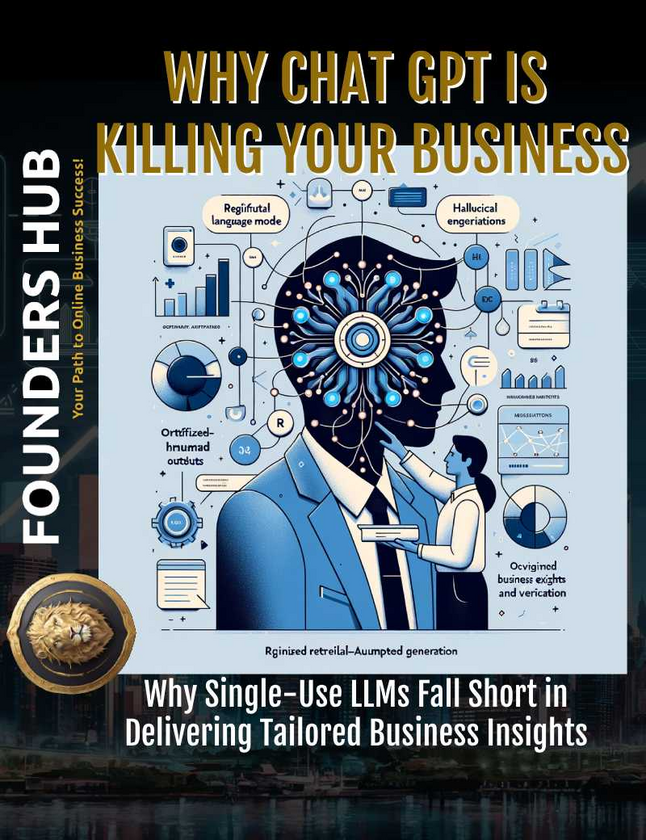


The world of search is rapidly evolving, and AI-powered search engines are leading the charge.
As technology advances, traditional search methods are being enhanced with artificial intelligence, offering users more personalized, efficient, and comprehensive search experiences.
For website owners, this shift presents both opportunities and challenges in ensuring their online presence remains visible and relevant in the era of AI search.
Read More on this subject https://foundershub.locals.com/post/6344474/the-future-of-search
The Podcast from The Founders Hub discusses the increasing importance of Large Language Models (LLMs) in revolutionising customer service through AI-powered chatbots and agents.
It highlights several leading LLMs, including OpenAI's GPT models for reasoning and complex queries, Anthropic Claude for ethical considerations, Mistral 7B for speed and cost-effectiveness, and Meta's LLama 2 for customisation.
The guide outlines key factors for businesses to consider when selecting and implementing an LLM, such as multilingual support, cost, scalability, integration, ethics, and performance. Ultimately, the text emphasises that choosing the right LLM and implementing it thoughtfully is crucial for enhancing customer experiences and gaining a competitive advantage.
🎯Read The Complete Article:https://foundershub.locals.com/post/6762447/top-large-language-models-llms-for-customer-service-chatbots-and-ai-agents
In this podcastst we discuss OpenAI's introduction of a new suite of high-end AI agents, priced between $2000 and $20,000 monthly, designed to automate intricate tasks and enhance decision-making across various sectors. These agents, powered by advanced language models, can interpret visual data, interact with interfaces, and execute complex multi-step operations.
🎯Read The Complete Article: https://foundershub.locals.com/post/6750832/the-future-of-ai-openais-revolutionary-20-000-ai-agents
How to prevent your bank account being cleaned out by scammers and hackers.
This podcast from The Founders Hub details five common mistakes that leave individuals vulnerable to online scams. Sharing personal information, granting remote access to untrusted sources, not using multi-factor authentication, responding to unsolicited communications, and acting on urgent requests are all highlighted as significant risks.
The podcast explains how scammers exploit these vulnerabilities and provides practical advice on how to protect oneself. It covers specific examples of scams and preventative measures are offered, emphasising the importance of verifying legitimacy and resisting pressure tactics. The overall aim is to empower you to safeguard your personal and financial data in the digital age.
🎯Read The Complete Article:https://foundershub.locals.com/post/6663358/5-common-mistakes-that-make-you-vulnerable-to-scammers
Meta, the company behind Facebook, Instagram, Messenger, and WhatsApp, is taking another bold step in merging artificial intelligence with its massive advertising machine. Starting later this year, your friendly conversations with Meta AI could quietly influence the ads you see across the company’s platforms.
Yes, your chats with Meta’s digital assistant — those curious questions about travel spots, recipes, or running shoes — might soon come back as targeted ads in your feed. It’s an unnerving but not entirely surprising evolution in the world of personalized marketing.
When It All Begins
Meta plans to begin this new data practice on December 16, 2025. Users across most regions have already started receiving notices as of October, warning them about the upcoming change. However, not everyone is affected — users in the European Union, the United Kingdom, and South Korea are exempt for now, thanks to stricter privacy regulations that prevent this kind of behavioral targeting.
The rest of the world, though, is fair game....

Hey everyone, this is Ebbe from Denmark.
I’m an AI specialist and content strategist with a background in psychology. I help small and medium-sized businesses use AI to save time and resources. With experience as a job consultant and educator, I combine technology and human insight to create valuable solutions — always with a practical approach and a touch of humor.
The journey can sometimes feel slow — maybe for you too. But I believe it’s essential to follow the process, be patient, and see challenges as opportunities for growth rather than sources of frustration.
With patience and small, consistent steps,
🔥 Our Updated Business Media App has everything you need to create:
✍️ Text, emails, articles, and blog posts
🎨 Images and creative content
💡 Ideas, Live Search & research tools
🌟 Boost your visibility with top-tier SEO tools for standard and AI-powered search.
💻 AI LAB keeps growing—new tools are added regularly!
⏳ Act Now!
🕒 Price increases in the new year!
🎁 Lock in all current & future tools for one low price!
👉 Don’t miss out—order today!


Atlas vs. Comet: Overview
OpenAI Atlas and Perplexity Comet are two new AI-powered browsers, launched within weeks of each other in October 2025. Both aim to transform how users interact with the web, but each takes a distinctly different approach to the integration of artificial intelligence in everyday browsing.
Feature | Atlas (OpenAI) | Comet (Perplexity) |
Core Philosophy | Task automation ("Let me do that for you") | Research and understanding ("Let me help you learn") |
AI Engine | Built on ChatGPT, agentic workflows | Perplexity AI, context-rich research workflows |
Launch Date | October 21, 2025 | October 2, 2025 |
Platform | macOS Apple Silicon (Windows and mobile soon) | Chromium (Windows, Mac), supports Chrome extensions |
Pricing | Free (premium for advanced agent features) | Free + Plus (subscription for advanced features) |
Quick Links
To get started testing Perplexity Comet and claim $10 in free AI credits, simply click here New users get a complimentary month of Perplexity Pro, a fast way to experience AI powered browsing risk free.
Core Benefits
OpenAI Atlas
Seamlessly integrates ChatGPT into the browser sidebar, enabling real time dialogue with web content.
Agent Mode can automate multi-step tasks: from booking a trip, shopping, or conducting multi tab research, all via simple instructions.
Customizable context memory allows Atlas to remember browsing patterns, user interests, and session context, offering enhanced personalization.
Suitable for action-oriented users who want the AI to take over and execute web tasks on their behalf.
Perplexity Comet
Prioritizes deep research, synthesis, and knowledge extraction, designed for users who want to learn and understand rather than delegate.
The Comet Assistant sidebar tracks context across tabs, providing inline answers, page annotations, and reliable sourcing for every AI response.
Allows users to highlight text and get instant follow-up explanations, great for deep reading, news summarization, and research projects.
Every insight is actively cited, ideal for professionals and students who value transparency and need traceability in summaries.
Supports all Chrome extensions, simple one click migration from Chrome/Edge, and includes privacy controls, local data storage, and a native ad blocker.
Try Perplexity Comet today and receive $10 in free AI credits! Claim your complimentary month of Perplexity Pro, perfect for anyone eager to explore the latest AI-powered browsing experience risk-free.
Features Detail
Feature Category | Atlas | Comet |
Task Automation | Advanced agent mode for task flows | Contextual research and summarization |
Multi-step Capabilities | Yes; automates web tasks | Partial; streamlines research flows |
Citation/Tracing | Relies on ChatGPT summarization | Inline citation; reliable traceability |
Platform Support | macOS exclusive, Windows/iOS soon | Chromium-based, Windows/Mac |
Chrome Extension Support | Planned, not present at launch | Full extension support |
Privacy Options | Agentic memory (opt-out possible) | Local storage, user controls |
Downsides and Issues
Atlas Downsides
ChatGPT sidebar sometimes delivers generic results and can miss personalized recommendations, even with access to interaction history.
Sidebar design can narrow the main content window, occasionally causing websites to render incorrectly or appear “janky”.
Privacy concerns: agent mode’s deep access to your browsing and memory features require careful management; sharing browsing context with ChatGPT carries both productivity gains and new risks.
Not yet available for Windows or mobile platforms at launch, limiting cross-device access.
Some technical UX problems have been reported, causing inconsistent site layouts.
Comet Downsides
For full feature access, users need to subscribe to Perplexity Plus or Max, with the premium tier priced significantly higher than competitors ($200/month for Max, though a free tier is provided)
Early reviews critique design as “cluttered” or “clunky”; some users prefer a more minimalist approach.
AI agent can occasionally hallucinate or provide incorrect task execution, and voice input can be sluggish.
Requires users to grant deep access to personal data for agent features to work best; transparency is improving but still not perfect.
Some tasks (like booking or shopping workflows) may fail or loop, and AI may struggle with ambiguous instructions.
Use Cases: Which Browser for Which Task?
For researching a complex topic, comparing sources, summarizing news, or academic reading, Comet offers better annotation, citation, and context retention.
For automating web-based workflows like multi-step bookings, filling forms, or executing tasks across various tabs, Atlas is superior in agentic automation.
For casual, rapid browsing or navigating to brand sites or tools, traditional browsers like Google Chrome still outperform both AI browsers.
Privacy Considerations
Both browsers pose new privacy challenges. Atlas’s memory and agent features mean the AI can record and process much of your web activity; it offers opt-outs and parental controls but requires vigilance. Comet is designed with privacy in mind, giving users options for local-only data storage and ad blocking, but deep AI integration means new kinds of tracking are possible.
Final Thoughts & Action
Both Perplexity Comet and OpenAI Atlas are at the forefront of AI-powered browsing, each designed around distinct philosophies: Comet for knowledge and research, Atlas for automation and execution. Carefully consider your workflow needs and privacy preferences before choosing.
Take advantage of the limited-time Comet $10 credits offer and complimentary Perplexity Pro trial—download, explore, and see if AI-powered research supercharges your productivity.

In the crowded landscape of web browsers, Comet stands out as the next evolution—an AI-native browser built by Perplexity that reimagines what it means to browse the internet. Unlike conventional browsers that simply help you navigate tabs and bookmarks, Comet brings true intelligence and functionality through deeply integrated AI-powered functions, changing passive browsing into active problem solving and productivity.
1. Native AI Integration: The Heart of Comet
Comet’s core architecture is built on the Chromium framework, ensuring speed and compatibility familiar to Chrome users, while transforming every aspect of browser interaction with artificial intelligence. Instead of AI being an optional add-on, every session and workflow includes native AI capabilities: Perplexity’s advanced models (Sonar, R1) and top external language models (GPT-5, Claude 4, Gemini Pro) are woven directly into the browser’s fabric.
AI-generated answers: Comet uses Perplexity as its default search engine, delivering synthesized answers to your natural language queries inside the browser—no more clicking through endless search results.
Contextual AI assistant: Summarizes page content, answers questions, explains difficult concepts, and keeps you focused while you browse, learn, and work.
Real-time task execution: Ask Comet to research, compare, and even initiate actions (like booking flights or making purchases), while you supervise the outcome.
Grab your Free Copy of the Comet Web Browser with AI built in
2. Automated Browser Workflows
Comet Assistant isn’t just a chatbot—it’s an embedded agent capable of automating and executing complex workflows:
Manage tabs and distractions: Automatically organize your tabs by category, close distractions, and consolidate research streams into easy workspaces.
Summarize emails and calendar events: Stay on top of communication without reading everything manually—Comet scans your inbox and events, surfacing the most important details.
Navigate and interact with websites: Complete forms, perform multi-step searches, and even shop or book travel just by telling Comet what you need—it carries out the process, saving you time and energy.
Interpret direct natural language commands: Get answers to research queries, compare product and travel options, or execute workflow tasks simply by typing requests in plain English.
3. Use Cases: How Comet Changes the Game
Comet isn’t just about browsing smarter—it’s about elevating everything you do online. Real-world use cases include:
Intelligent Research: Instantly summarize articles, compare viewpoints, and bring together insights from multiple sources in seconds.
Project & Learning Assistant: Create study plans from syllabuses, explain technical topics, or act as a context-sensitive tutor who adapts explanations to your current reading level.
Email and Calendar Management: Automate replies, scheduling, and information extraction from large volumes of messages.
Shopping and Booking: Compare products, pull details from merchants, and automate purchases or bookings—all with a single request.
Legal and Content Discovery: Locate hidden documents, find specific legislation, and receive context-aware recommendations relevant to your work session.
Personal Organization: Workspace model allows handling multiple research threads, active projects, or comparison tasks without drowning in tabs.
Developer Opportunities: Native AI API gives developers a canvas for intelligent web apps that leverage Comet’s automation for richer, smarter experiences.
Grab your Free Copy of the Comet Web Browser with AI built in
4. Privacy, Safety & Performance
Privacy-focused: Comet applies strong privacy protections for query analysis and browsing patterns, keeping sensitive information secure while enabling useful AI assistance.
Hybrid processing: Local page rendering for speed, with cloud AI capabilities for heavy lifting—delivering both responsiveness and scalability.
Available to all: Free for basic users with advanced features for subscribers, and easy installation across platforms.
5. Why Download and Use Comet Browser?
Supercharges productivity: Transforms research, learning, shopping, personal organization, and multitasking with instant, intelligent automation.
Reduces friction: Moves you from manual browsing to assisted cognition—every task gets easier, every result more relevant, and every session more focused.
Adapts to your needs: Whether you’re a developer, professional, student, or everyday user, Comet’s flexible architecture supports everything from casual browsing to heavy multitasking.
Personalized AI experience: The more you use Comet, the smarter and more indispensable it becomes, learning how you think and what helps you most.
In summary:
Comet Browser is the front-runner in the next generation of AI-powered web browsers. It’s more than a tool—it’s a personal assistant, a researcher, a teacher, an organizer, and a workflow engine, all built into your browser window. If you’re ready to take your internet experience from passive navigation to active cognition and genuine productivity, Comet deserves to be your new browser of choice.
Grab your Free Copy of the Comet Web Browser with AI built in

Anthropic has taken a significant step forward with Claude Code, its once-command-line-only agentic AI coding assistant, by launching dedicated web and mobile interfaces. The update is not just about convenience—under the hood, Claude Code now introduces an advanced sandboxing environment, fundamentally enhancing both the user workflow and security posture surrounding automated, agent-driven coding.
Web and Mobile Rollout
Previously, Claude Code operated as a CLI tool favored by developers seeking AI-driven code suggestions, automation, and multi-step task execution. With the new update, developers can access Claude Code directly from a web browser, offering a familiar and visual interface. The launch also introduces a mobile app, although for now, it’s limited to iOS users and remains in an early-access stage.
A noteworthy feature is the ability to connect Claude Code to a GitHub repository. Developers can provide high-level instructions—such as “add real-time inventory tracking to the dashboard”—and Claude Code handles the rest, running tasks, providing progress updates, and even allowing for mid-process feedback or correction without having to restart the session. This capability supersedes the previous limitation, where developers often had to abort and restart tasks if mistakes or omissions were spotted mid-execution. Multiple coding sessions can run concurrently, each accessible from a left-hand navigation panel, supporting more parallel workflows and context switching.
The Power of Sandboxing
Where this release stands out is Anthropic’s novel sandboxing runtime. Traditionally, agentic coding tools like Claude Code requested permission for each significant action, seeking user approval step by step—a mechanism designed to prevent unintentional changes or malicious exploitation, including prompt injection. While secure, this approach led to workflow slowdowns and repetitive interruptions.
The new sandboxing model allows developers to specify up-front which folders and servers Claude Code can access. With these permissions set, the bot can independently execute its actions within those constraints, greatly reducing the frequency of user prompts. Anthropic’s new system also offers advanced network isolation: all outgoing Internet traffic from Claude Code is routed through a proxy outside the sandbox, restricting the agent’s online reach and requiring user consent before communicating with new domains. Developers can fully customize the rules dictating allowed connections, striking a balance between autonomy and control.
This means Claude Code can fetch dependencies—like npm packages—from trusted sources without granting it open, unsupervised Internet access. Not only does this streamline development, but it also dramatically minimizes risks from prompt injection attacks, careless code modifications, or data exfiltration.
Trade-Offs and Workflow Evolution
While the reduction in micro-approvals brings obvious convenience, it shifts some security responsibility back to the developer. The earlier approach, requiring granular approval, ensured that every code change and network access was reviewed. With sandboxing and broader permissions, it becomes even more critical for teams to conduct thorough code reviews, as subtle or flawed changes may slip through during more autonomous agent operations.
Despite these challenges, the new workflow will appeal to teams needing rapid iteration and bulk process automation, where detailed oversight of every AI-generated step would be a hindrance rather than a help.
Availability and Forward-Looking Impact
These new features are now live in beta as part of a research preview, available to subscribers on the Claude Pro or Max plans. Anthropic’s move is seen as a major stride forward—not just for their product, but for the broader adoption and responsible deployment of agentic coding tools in both enterprise and open-source environments.
With Claude Code’s web version and advanced sandboxing, the future of automated software development promises greater flexibility and productivity—but also demands new standards for safe, accountable, and auditable AI collaboration in codebases.












